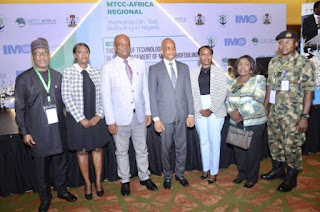Hot Posts
6/recent/ticker-posts
NIMASA Sensitizes African Nation On Biofouling Technology Transfer
By Chinonye Anyatonwu
November 01, 2023
By Chinonye Anyatonwu
The Nigerian Maritime Administration and Safety Agency (NIMASA) on Monday commenced a 3-day workshop in partnership with the Maritime Technology Cooperation Center (MTCC) on how to assist developing countries advance their knowledge about and facilitate the implementation of the International Maritime Organization (IMO) Biofouling Guidelines owing to the complexity of biofouling management and the technologies available.
Biofouling makes it harder for ships to maneuver and stay on course, increasing fuel consumption and Green House Gas emissions (GHG). Over time, these emissions can add up and contribute significantly to climate change.
Some of the African countries participating at the workshop are Kenya, Somalia, Djibouti, Comoros, Mauritius among others.
In his keynote address at the workshop, the Director General of NIMASA, Dr Bashir Jamoh said that these harmful organisms attached themselves to the outer surface and niche areas of a ship, and are then translocated from one ecoregion to another.
According to him, the process by which these organisms attached themselves to the ship and other surfaces is referred to as Biofouling.
Dr. Bashir Jamoh OFR, posited that the training would showcase the newest technologies, their application including cost-effective practices and related benefits for the environment and efficiency of shipping.
His words: “The importance of protecting and conserving our seas, oceans and their inhabitants cannot be overemphasized as we are intrinsically linked to them and their wellbeing reflects our own wellbeing too.”
“Shipping is at the crux of global trading and the economy with about 90 percent of world trade and commerce is facilitated through shipping.
Studies however, revealed that ships serve as over a time have channel for transportation of harmful non-indigenous Invasive Aquatic Species (IAS). These organisms attached themselves to the outer surface and niche areas of a ship, and are then translocated from one eco region to another.
Noting that Nigeria’s economy relies heavily on international trade, the NIMASA boss emphasized that shipping is a key component of the country’s import and export activities, but it inevitably exposed the nation to threats of the IAS transfer into our territorial waters.
While welcoming all participants to the workshop, he encouraged the foreign delegates to explore and enjoy the fascinating sights of the coastal city of Lagos.
Also speaking at the workshop, the Director, Head, Department of Partnerships and Projects, IMO, Dr. Jose Matheickal said that the IMO is excited that NIMASA has taken the lead in the strategic MTCC Africa training on TEST Biofouling in Nigeria
“We have been encouraging more women to participate in the sector and we are very excited to find by African Women in Maritime (WIMAFRICA) Nigeria and other women groups emerging in the maritime space,” Dr. Jose stated.
Categories
Popular Post

Murtala Muhammed Area Command Collects ₦202.9 Billion Revenue in 2025
February 04, 2026
Emperor Global News 2020
Categories
Contact
Search This Blog
- February 20265
- January 202628
- December 202521
- November 202527
- October 202533
- September 202537
- August 202525
- July 202536
- June 202532
- May 202540
- April 202520
- March 202534
- February 202525
- January 202515
- December 202425
- November 202420
- October 202421
- September 202416
- August 202424
- July 202425
- June 202418
- May 202435
- April 202426
- March 202434
- February 202417
- January 202420
- December 202326
- November 202330
- October 202311
- September 20232
Main Tags
Recents
{getWidget} $results={3} $label={recent} $type={list1}
Most Popular

Murtala Muhammed Area Command Collects ₦202.9 Billion Revenue in 2025
February 04, 2026

PTML Command Hands Over Seized Arms And Ammunition To NCCSALW
January 30, 2026
Tags
Categories
Random Posts
3/random/post-list
Latest
Popular Posts
Footer Menu Widget
Crafted with by TemplatesYard | Distributed by Blogger












0 Comments